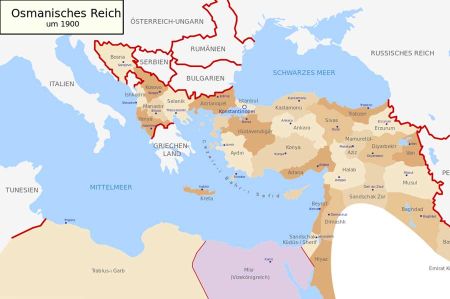The Last Ottoman - Ertugrul Osman
Ertugrul Osman - the would-be sultan known in Turkey as the "last Ottoman" - has died in Istanbul at the age of 97. Osman would have been sultan of the Ottoman Empire had Turkey's modern republic not been created in the 1920s.
As the last surviving grandson of Sultan Abdul-Hamid II, he would have been known as his Imperial Highness Prince Shehzade Ertugrul Osman Effendi. Born in Istanbul in 1912, Osman spent most of his years living modestly in New York.
The (Ottoman) Empire Strikes Back – Turkey Moving Eastward
Turkish Prime Minister Erdogan longs to renew the glory days of the Ottoman Empire and is turning his back on Europe and the United States.
As the world continues to contemplate the Gaza flotilla and lays more criticism on Israel, Turkey is dealing with its own military onslaught. This weekend, a serious escalation took place in the Turkish army’s strategy against Kurdish rebel targets inside Iraq. Regarding this, commentators in Europe and the United States have begun questioning: What needs to be done with regard to Turkey’s aspirations to spread its influence eastward?
Yesterday, Turkish warplanes again attacked targets in northern Iraq, claiming they were Kurdish rebel bases, part of the PKK Kurdish rebel group. The bombing was part of a response to a rebel attack on a Turkish position, in the aftermath of which 9 Turkish soldiers and 12 Kurdish rebels were killed.
Preceding this was a ground attack that began two days ago in which armored personnel carriers carrying Turkish special forces pushed their way into Iraqi territory (the APC’s were visible in pictures of the battlefield armed with Israeli defense systems). All in all, according to the Turkish army, more than 40 Turkish soldiers and 120 Kurdish rebels have been killed in the last three months.
The PKK has for years been listed as a terrorist group—both by the European Union and by the United States. Both have given Turkey military and intelligence assistance in her war to eradicate the Kurds, who claim autonomy on the southeastern region of Turkey. Among the allies that armed Turkey for this war, Israel has a seat of honor, whose homemade UAV’s were sent to gather intelligence on the rebel’s bases.
Frustrated by Europe
But all this belongs to days long since gone. Presently, the map of interests has changed and the escalation in tensions with the Kurds is being seen as another piece of the puzzle that makes up what is now being termed “Neo Ottomanism.” Meaning, the aspiration of Erdogan’s Turkey to expand eastward and renew the days of the Ottoman Empire, which controlled huge territories in the Middle East, the Balkans, and Europe, for hundreds of years until it was beaten in World War I.
Some of the commentators believe that this is a chicken and the egg issue. That is to say, that Turkey’s giving the cold shoulder to the West came only after Turkey felt that there was no chance it would ever really belong to Europe.
“They got negative feedback again and again from the Europeans,” said David Kottel, director of the Institute for Turkish Studies in Washington. “They’re frustrated. They’ve given up on Europe.” According to him, Erdogan’s policies flow from a feeling that “if Europe doesn’t want us, let’s make friends with our neighbors.”
A Slap in the Face to the United States
As the Arab world continues to applaud the new Turkish foreign policy, in the United States there is only confusion. They especially cannot digest the tightening of ties with Iran and Syria, which throughout the years were considered enemies. (It was only in 1998 that Turkey and Syria almost went to War.)
The latest slap in the face that the US got was the Turkish opposition in the Security Council on the sanctions vote against Iran, immediately after which came an official Turkish invitation for Iranian President Ahmadinejad to visit the country.
Jowal Brinkali, an American commentator, wrote last week that these two processes have left the American administration despaired and out of ideas. American Secretary of Defense Robert Gates also thinks that Europe gave Turkey no choice. “Turkey veered eastward, but in my opinion, she was forced there to a large extent,” he said. The European Union, of course, denies these accusations.
And maybe it all stems from internal political motivations? Erdogan will run once again in next year’s elections, and he has a vocal opposition. Only yesterday it was published that former diplomats sent him a letter in which they warned him that his warlike declarations could get Turkey into trouble. They, too, know: Erdogan learned that his voters love hearing tough words against Israel and the West.
Please read as well:
